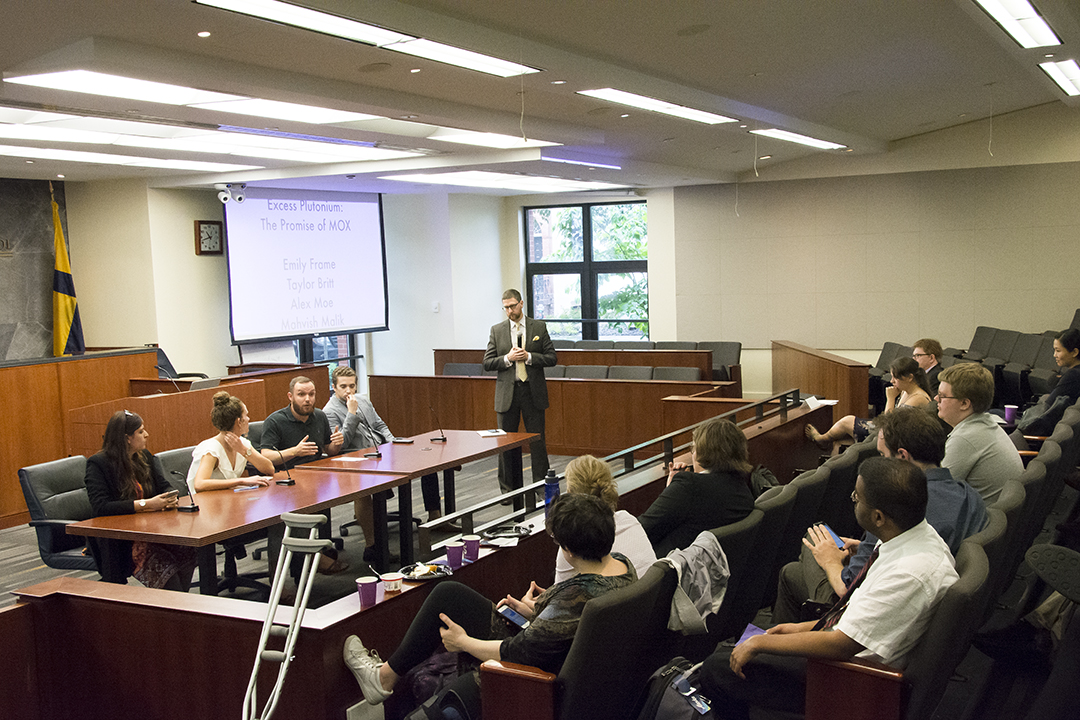Faculty members from GW Law, the Columbian College of Arts and Sciences, and the Elliott School of International Affairs collaborated on the Institute for International Science and Technology Policy's first Annual GW Boot Camp on Nuclear Security Policy from June 10 through 22, 2018. The camp, conducted pursuant to a $1.7 million grant from the National Nuclear Security Administration, provided opportunities for advanced-degree students of nuclear science, engineering, and social sciences to focus deeply on law and policy issues in nuclear security and civilian nuclear uses. Students participated in classroom activities, workshops, and simulations, networked with nuclear policy professionals, and visited Capitol Hill, the State Department, and the Nuclear Regulatory Commission.
Christopher Cahill, Professor of Chemistry and International Affairs at the Columbian College of Arts and Sciences, spoke about the collaborative process that took place between the faculty members across the different schools. He explained that the nuclear arena is incredibly complex, so effective engagement requires an appreciation for a very broad range of topics and perspectives. This is exemplified not only by the diversity of topics presented in the boot camp, but also in the backgrounds of the organizers. "My own expertise in nuclear chemistry contributes only partially, and Professor Hammond's expertise in regulatory structure and the U.S. legislative process rounds out much of the legal aspects of all things nuclear," he said. "Moreover, co-organizers Professor Allison Macfarlane and Research Professor Sharon Squassoni [both of the Elliott School of International Affairs] bring extensive expertise in nuclear waste management and nuclear weapons (respectively) and further highlight the complexity of the subject matter."
Emily Hammond, Glen Earl Weston Research Professor of Law, adds, "GW has a unique depth of expertise across a wide variety of disciplines. It was rewarding to learn from one another as we developed our 'dream workshop' canvassing these issues." She adds that Ralph Steinhardt, Lobingier Professor of Comparative Law and Jurisprudence, was an invaluable part of the workshop's coverage: "Professor Steinhardt brought to life both international law and the societal implications of nuclear weapons. His contribution to the workshop further deepened our sense of community at GW."Rising 3L Ariel Braunstein, a joint-degree student in Law and International Affairs, was also involved in organizing the boot camp. She helped plan the international law portion and taught a section on treaty law—what a treaty is and the obligations imposed on the parties as per the Vienna Convention on the Law of Treaties. Ms. Braunstein also organized other speakers to visit for a conversation, including individuals from the Nuclear Regulatory Commission's Office of International Programs and National Nuclear Security Administration's Office of the General Counsel. Of the experience, Ms. Braunstein shared that "it was a wonderful opportunity to be able to work alongside some of the professors I've most respected while being in law school," she said, "and this [opportunity] allowed me to showcase a significant portion of what I learned both from their classes and my own work experience."
The boot camp participants expressed appreciation for the depth of the workshop, the "career-changing" insights they developed, and the opportunity to forge lasting relationships. According to Professor Hammond, "the feedback we received was terrific. We can't wait to build on this foundation for next year."



